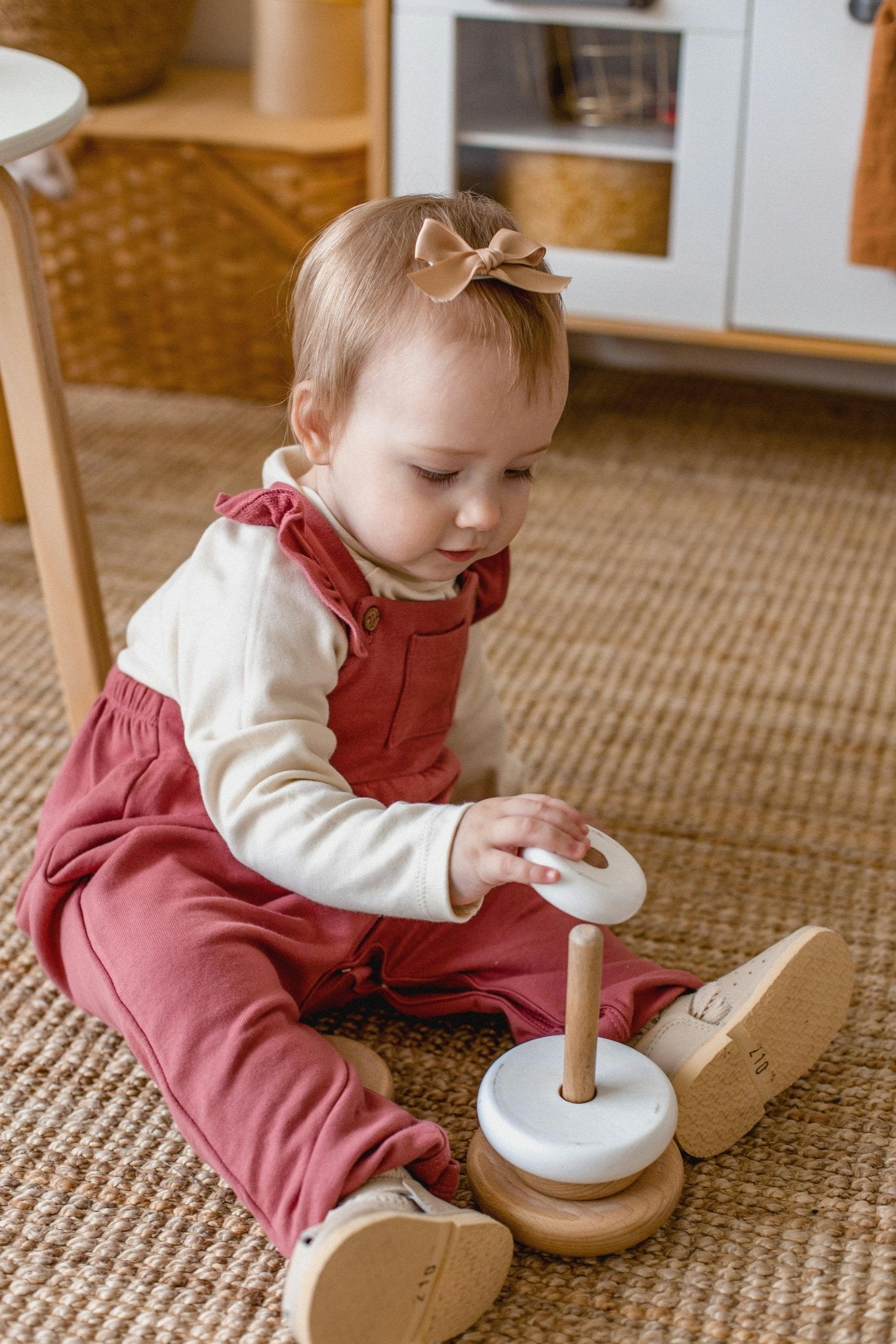Article: The Benefits of Play in Child Growth

The Benefits of Play in Child Growth
Introduction
Play is an essential element in children's development, influencing not only their emotional well-being, but also their cognitive, social and physical abilities. Often perceived as a simple leisure activity, play is actually a powerful educational tool that allows children to explore the world around them, learn new skills and develop their creativity.
In this first part of the article, we will analyze the importance of play for child development, exploring its different types and the specific benefits it brings at each stage of growth.
The Role of Play in Child Development
Play is one of the most natural activities for a child. From birth, newborns begin to interact with their surroundings through movement and exploration, laying the foundation for healthy and harmonious development.
From a scientific point of view, numerous studies show that play has a direct impact on brain development, promoting the formation of neural connections that influence memory, problem solving and the ability to concentrate. In addition, play is essential for the development of motor skills and coordination.
Playing allows children to experience emotions, develop the ability to manage stress and learn the social dynamics that are fundamental to their growth. Through play, the little ones learn to relate to others, to collaborate, to express their emotions and to understand the rules of society.
The different types of game
1. Sensory play
From the first months of life, babies explore the world through their senses. Sensory play, which involves touch, sight, hearing, taste, and smell, is essential for the development of cognitive and motor skills. Materials such as fabrics of different textures, noisy objects, and colorful toys stimulate curiosity and help build a deeper understanding of the surrounding environment.
2. Symbolic play
As children get older, they begin to use their imagination to create imaginary scenarios and act out different roles. Pretend play, such as pretending to be a doctor, teacher, or superhero, is essential for the development of language, empathy, and problem-solving skills.
3. Motor play
Physical activity is crucial for children's growth, and motor play helps them develop balance, coordination, and muscle strength. Running, jumping, climbing, and playing outdoors are activities that contribute to a child's physical health and overall well-being.
4. Social play
Playing with other children is essential for the development of social skills. Through group play, children learn to negotiate, respect rules, and collaborate with others. This form of play also fosters the ability to resolve conflicts peacefully and to understand other people's points of view.
The benefits of play for cognitive development
Play is not just fun, but an opportunity for continuous learning. Through play, children develop logical reasoning, memory, attention, and creativity.
- Improves problem-solving skills: Games such as puzzles, building blocks, and activities that require strategic solutions help develop critical thinking and problem-solving skills.
- Stimulates creativity: artistic games, drawings, manipulation of plasticine and constructions encourage creative expression and the ability to invent new solutions.
- Promotes language learning: symbolic play and role play allow children to enrich their vocabulary and improve communication skills.
- Increases memory and concentration: playful activities that require attention and repetition, such as memory or card games, improve the ability to memorize information.

How to encourage play in children
After analyzing the fundamental role of play in the growth of the child and its different types, it is essential to understand how parents and educators can effectively encourage it. Play should not be seen as a secondary activity, but as a real learning tool that must be stimulated through favorable environments, adequate materials and a conscious educational approach.
Creating a stimulating environment
One of the most important aspects to encourage play is the environment in which the child grows. Having a safe and organized space for play, with accessible and diverse materials, allows the child to explore freely and develop new skills. A corner dedicated to play, with soft carpets, child-sized shelves and a selection of games that stimulate creativity and interaction, can make the difference in the development of their skills.
It is also useful to alternate structured games with everyday materials, such as boxes, fabrics, containers and natural objects, which stimulate curiosity and experimentation. Children love to transform objects and give them new meanings, an activity that strengthens creative thinking and problem solving skills.
The active role of parents in play
While independent play is essential for the development of independence, active parental presence is equally important. Children learn through imitation, and active adult participation can enrich their play.
Some tips for engaging effectively in the game include:
- Follow the child's initiative , leaving him the freedom to choose the activity and guide the game.
- Interact enthusiastically , asking questions, making observations, and encouraging new ideas.
- Avoid over-correcting or directing , leaving room for inventiveness and independent exploration.
- Offer new activities based on the child's interests , without forcing him to play certain games.
Time spent playing together strengthens the bond between parents and children and helps the child develop communication and emotional skills.
Playful activities for every stage of growth
Each stage of child development is characterized by different needs and abilities. Proposing games appropriate to the child's age guarantees an engaging and educational experience.
Newborns (0-12 months)
At this stage, play is predominantly sensory and motor. Some recommended activities include:
- Games with mirrors and reflective objects to stimulate curiosity and recognition of one's own body.
- Tactile materials such as plush toys, soft fabrics, and objects of different textures to encourage sensory exploration.
- Songs and nursery rhymes that introduce children to the sounds and rhythms of language.
Toddlers (1-3 years)
During this period, the game becomes more interactive and symbolic. Some suitable activities are:
- Construction games with blocks and interlocking pieces to develop coordination and logic.
- Symbolic play such as cooking with toy pots or caring for dolls and stuffed animals.
- Artistic activities such as crayon drawing and finger painting to stimulate creativity.
Preschool children (3-6 years)
Children begin to socialize more and experiment with more complex role-playing games. Some suggestions are:
- Simple board games to teach respect for the rules and turn taking.
- Outdoor activities such as running, jumping and balance courses to improve motor skills.
- Telling and dramatizing stories to enhance language and imagination.
School-age children (6-10 years)
At this stage, children refine their logical thinking and social interaction skills. Recommended games:
- Strategies and board games , such as chess or cards, to stimulate critical thinking.
- Simple science experiments to encourage curiosity and learning.
- Sports activities to improve coordination and collaboration.

The importance of free play
While structured play is very helpful, free play is just as essential. Allowing children to explore and invent freely without rules imposed by adults fosters their independence and ability to make decisions.
Free play can take place in open spaces, such as parks and gardens, or at home, through the creation of imaginary worlds with everyday objects. The absence of constraints allows children to experiment, solve problems independently and develop greater confidence in their abilities.
Conclusion
Play is an essential component of a child's growth and should be encouraged in all its forms. It is not just a recreational activity, but a powerful educational tool that promotes cognitive, emotional and social development.
Parents and educators have the task of creating an environment that stimulates play in a varied and natural way, adapting it to the age and interests of children. A balanced mix of structured play and free play guarantees more effective and engaging learning.
In light of what has been analyzed, it is clear that play is never a waste of time, but a valuable investment for the child's future. Offering time and space for play means supporting the development of the skills needed to face the world with confidence and creativity.



Comment
This site is protected by hCaptcha and the hCaptcha Privacy Policy and Terms of Service apply.